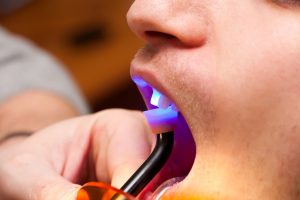 Dental bonding is one of the most affordable and easiest methods to repair or change the appearance of teeth.
Dental bonding is one of the most affordable and easiest methods to repair or change the appearance of teeth.
Bonding is used to:
- Close gaps between teeth
- Alter the shape of teeth
- Make teeth appear longer
- Replace amalgam fillings
- Repair teeth that have decayed
- Improve discoloration of teeth
- Protect a tooth’s root exposed to a receding gums
- Repair cracked or chipped teeth
A tooth-colored composite resin made of durable plastic (occasionally mixed with glass) is applied during the bonding procedure. A special light is used to fasten or bond the material to your original tooth. Your Auburn dentist will select from a wide range of shades and colors in order to best match the color of your other teeth. This attention to detail makes it almost impossible to distinguish a bonded tooth from your other teeth.
While not lasting quite as long as a veneer, another benefit to tooth bonding is that it can usually be completed within a single visit to your dentist.
The Procedure
The first step is to select the correct shade of composite resin to achieve the most natural looking results. Then, your original tooth will be cleaned and prepped for bonding by applying a conditioning gel. This conditioning gel will open small pores in your tooth that will ensure proper adhesion of the bonding material.
Next, a clay-like resin that matches the color of your tooth will be applied and molded to the proper shape. A special curing light is then used to set the material. If needed, additional layers of resin can be applied. Your dentist will continue to trim and shape your tooth until the desired appearance and finish is achieved.
Lastly comes the final polishing of your tooth. The whole procedure takes approximately 30-60 minutes to complete.
Proper Care of Bonded Teeth
You can continue to care for your bonded teeth just as you do your normal teeth. Your daily routine should include brushing and flossing and you should continue to see your dentist for regularly scheduled cleanings.
Just like your natural teeth, composite resin can absorb stains from coffee, tea, red wine and smoking. However, bonded teeth cannot be whitened the same as your natural teeth. Therefore, be aware that if you undergo professional tooth whitening, your bonded teeth may not fully match the rest of your teeth.
Lastly, be mindful that bonded teeth can tend to chip more easily than normal teeth. With that in mind, it is best to avoid chewing on hard items (such as hard candy, ice or pens), biting your nails or any other activity that puts excessive force on your bonded teeth.
How Long Should Bonded Teeth Last?
The longevity of your newly bonded tooth depends on a few factors: your personal oral habits, the type of material used and how much bonding was performed.
Wonder if dental bonding is right for you? Make an appointment to meet with your Auburn dentist at the office of Rock Creek Dental today and we will be happy to discuss your options.
